MEXICO CITY — As the year began, the dominant political figure of Mexico’s left appeared to be heading swiftly toward irrelevance.
But Andrés Manuel López Obrador is not dead yet.
Only two years ago, Amlo, as he is known, was the driving force in Mexico’s polarized politics. After he narrowly lost the presidency and led months of street protests charging that it had been stolen from him, politics boiled down to one issue: who was for him and who was against.
Last year, his hold on public attention began to falter. The public, the news media and many of his supporters had simply moved on, letting the turmoil of the 2006 election fade into history.
But there are signs that the efforts of Mr. López Obrador, a former Mexico City mayor, to revive his political career may be gaining traction, as a deepening recession creates opportunities for his brand of economic populism. The question now is whether he can capitalize on that momentum to remake and expand the coalition that brought him to within a hair’s breadth of the presidency.
At a rally last week in Mexico City’s immense central square, the Zócalo, Mr. López Obrador, 55, drew tens of thousands of supporters. Though the crowd paled beside the hundreds of thousands who attended his rallies at the peak of the 2006 presidential campaign, it was significantly larger than that at any of his rallies in the previous year.
Unlike his campaign events, it was conducted without the benefit of his party’s machinery, which used to truck in supporters from around the country, demonstrating a substantial base of hard-core support.
Saying that the economy will only get worse, Mr. López Obrador announced a campaign to press the government to cut wasteful spending, lower consumer prices and taxes, and do more for the poor.
“Our movement must continue demanding a change in economic policy, which has demonstrated its failure,” he said. “The model must be changed. You cannot put new wine in old bottles.”
The words clearly resonated with his poor and working-class base.
“We think he really can change things, so that people have the right to decide,” said Aide Florentino, 27, a member of a small garment cooperative in the rural southern part of Mexico City.
“It’s not important if López Obrador is the president,” said Víctor Baltasar, 49, who traveled to the rally from Guadalajara, where he is a supervisor for the city’s train system. “What’s important is that things change.”
But rising anxiety over the economy may be broadening his appeal. Despite government measures aimed at stimulating the economy and buffering households against the worst effects of the crisis, there is a widespread clamor to do more, from constituencies as varied as business groups and poor peasants and fishermen. That demand could alter the political calculus.
“Mexico is fundamentally a conservative country,” said Federico Estévez, a political analyst at the Autonomous Technological Institute of Mexico. “But in 2009, the cards are different.”
Referring to the left, he said, “I think they’re holding a wild card or a couple of aces.”
With the next presidential election three years off, Mr. López Obrador’s precise ambitions are unclear. He calls his new campaign a social movement and clearly aims to be a force to be reckoned with.
But his relationship with his own party remains fraught. Last year he lost a battle with a rival faction over the presidency of the party, the Party of the Democratic Revolution, or P.R.D., and he no longer holds any official position in the party or in government.
The low point came last fall, when most of the senators from his party broke with him to approve an important energy bill, as his supporters scuffled with police officers in an attempt to block the vote.
To many who had backed his presidential bid, Mr. López Obrador’s street-brawling political style had become a liability.
His campaign to overturn the results of the 2006 election, which he lost by only six-tenths of 1 percent of the total vote to Felipe Calderón, consisted of mass rallies and a tent city that shut major avenues in the capital for weeks. Refusing to concede, even after the country’s highest electoral court ruled in favor of Mr. Calderón, he held a grand public ceremony in which he had himself sworn in as the “legitimate president” of Mexico, a title he continues to claim.
Such antics have damaged the party’s reputation, officials say. Jesús Ortega, the party president, who defeated Mr. López Obrador’s choice for the post, said the party’s polling showed that two-thirds of Mexicans identified the P.R.D. as disruptive.
Moreover, the polls put the party in third place for midterm elections in July, when voters will elect all 500 members of Mexico’s lower house, the Chamber of Deputies. The party is currently projected to win 18 percent of the vote, half its showing in 2006.
While Mr. López Obrador’s popularity catapulted it in 2006 from the third largest to the second largest party in Congress, the party now stands to lose many of the seats it picked up then.
Mr. Ortega, while shying away from blaming Mr. López Obrador for the decline of the party, made it clear that he wanted to remake its image into that of a party closer to social democratic governing parties in Chile and Brazil, and that street blockades were not in the plans.
“Protests against injustice should not affect citizens’ rights,” Mr. Ortega said. “We have to learn to fight within the limits of the law.”
The party has begun running gauzy television spots asking voters for their forgiveness and declaring its willingness to work with other parties, a pointed contrast with Mr. López Obrador’s campaign of permanent harassment.
Publicly at least, Mr. López Obrador and his party say they have worked through their differences. Analysts say neither one can afford a split. “If the left as a whole doesn’t recoup before the elections on the basis of economic issues alone,” Mr. Estévez said, “then they really have no chance of ever ruling.”
Mr. López Obrador needs the structure and resources a large party provides, analysts said. And the party cannot jettison its most charismatic politician.
“The P.R.D. realizes they can’t give him up,” said Daniel M. Lund, a pollster who has done work for Mr. López Obrador, but not since 2004. “If the P.R.D. breaks with López Obrador, they will go to single digits.”
Where that leaves Mr. López Obrador’s movement is uncertain. Although 2012 is a long way off, none of the party’s current leaders have anywhere near his larger-than-life stature as a potential presidential contender.
What is evident is that while talk of a comeback may be premature, so was writing him off.
“He’s a charismatic, intuitive politician,” said Joy Langston, an analyst with the CIDE, a Mexico City research institution. “He not only knows how to win over the masses but also to govern in a way that continues his popularity. Amlo will never be completely finished.”
La "profunda recesión" en México fortalece a su movimiento, afirma el diario
El New York Times publica el día de hoy un artículo en el que señala que la popularidad de AMLO se ha visto fortalecida por la crisis económica. Menciona, además, que inclusive sin el PRD sigue teniendo una fuerte base de apoyo en sus seguidores.
"Andrés Manuel López Obrador no está muerto aún", dice en un artículo para su sección "Américas" el diario The New York Times.
De acuerdo con el artículo, AMLO se "revive" debido a la "profunda recesión" en la que México se encuentra. La pregunta, de acuerdo con el NYT, es si AMLO "puede capitalizar ese impulso para rehacer y expander la coalición que lo llevó a un un pelo de la presidencia."
El NYT menciona que en el mitin del 25 de enero pasado, López Obrador desbordó de nuevo el Zócalo con decendas de miles de simpatizantes; significativamente más que en cualquier mitin del año pasado.
Sin embargo, hace notar el NYT, el mitin del 25 no fue conducido por la maquinaria del PRD, lo cual demuestra una fuerte base de apoyo inclusive sin ese partido.
Luego de sintetizar las ideas del discurso lopezobradorista en defensa de la economía popular, el NYT publica las declaraciones de seguidores de AMLO. Uno de ellos señala que "nosotros pensamos que (AMLO) puede cambiar las cosas para que la gente tenga el derecho a decidir."
Pero lo que tal vez resulte el secreto para entender a AMLO es lo declarado por otro simpatizante de Guadalajara: "no es importante que López Obrador sea presidente; lo que importa es que las cosas cambien."
De acuerdo con el NYT, la ansiedad por la economa está ampliando el carisma de AMLO. Dice el NYT: "Aunque el gobierno (panista) ha tomado medidas enfocadas en estimular la economía y amortiguar a los hogares contra los peores efectos de la crisis, hay un clamor generalizado para hacer más, de electores tan variados como grupos de empresarios y campesinos y pescadores pobres. Esa demanda podría alterar el cálculo político."
Cita el NYT, inclusive, a Federico Estévez, analista político del ITAM, quien menciona que "México es fundamentalmente un país conservador, pero en 2009 las cartas son diferentes. Creo que (la izquierda) tiene más aces bajo la manga."
Respecto a la relación con el PRD el NYT menciona los intentos de Jesús Ortega por deslindarse de AMLO, pero luego cita al encuestador Daniel M. Lund, quien afirma que "si el PRD rompe con López Obrador, se irán a los dígitos sencillos". Es decir, con un rompimiento con AMLO, el voto a favor del PRD no pasaría del 9%.
Si bien el New York Times alega que no es posible determinar hacia donde irá el movimiento de AMLO, al mismo tiempo subraya que ninguna de las figuras del PRD siquiera se acerca a la estatura de AMLO como posible candidato presidencial. Es decir, si bien no se puede saber su contendrá por la presidencia, ya que aún faltan 3 años para 2012, tampoco se le puede descartar.
Cierra el NYT citando a Joy Langston, analista del CIDE, quien menciona que AMLO "es un político carismático que no sólo sabe como ganarse a las masas, sino que también sabe como gobernar de una manera que preserva su popularidad. AMLO nunca estará completamente acabado."















































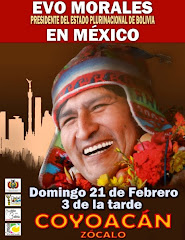





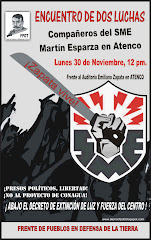
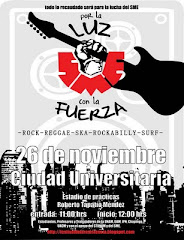
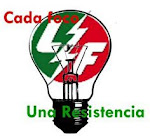.jpg)

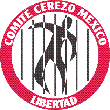


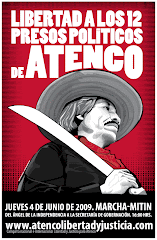

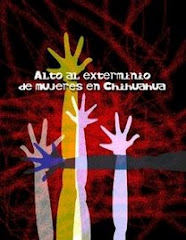




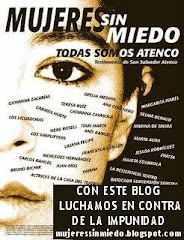




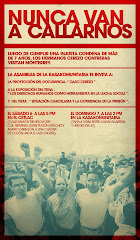.jpg)
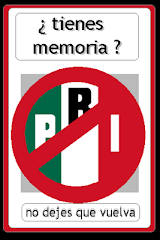




No hay comentarios.:
Publicar un comentario